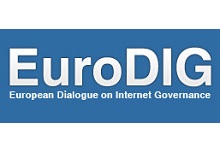Encouraging a multilingual Internet
18 Jun 2019 12:00h - 14:00h
Event report
[Read more session reports and live updates from the EuroDig 2019]
The session organised by the Dynamic Coalition on Domain Name System (DNS) Issues (DC-DNSI), featured discussions on the processes needed to ensure universal acceptance (UA) on the Internet. UA refers to the situation in which software can accept all valid domain names and email addresses. The round-table discussion, moderated by Ms Melinda Clem (Vice-President for Strategy, Afilias), focused on how low awareness of UA-readiness hampers access to digital economies and how to encourage public sector adoption of UA-readiness.
Clem introduced the session by highlighting the need for a common terminology for UA, in order to facilitate awareness among end-users. She argued that there is a clear need for UA on the Internet, and invited panellists to propose ways in which decision makers can be encouraged to support UA and allow its implementation at the technical level. UA is currently on the European Dialogue on Internet Governance (EuroDIG) agenda, but it will also feature in several sessions of the upcoming meeting of the Internet Corporation for Assigned Names and Numbers (ICANN65) in Marrakesh, Morocco.
Mr Lars Steffen (Director, eco International) started the session by pointing to resources made available by the Universal Acceptance Steering Group (UASG), such as the guide on UA, and a checklist for developers to facilitate their implementation of UA-readiness measures. Steffen indicated that concerns about the DNS security remain an issue for several key actors. Indeed, it can be difficult to communicate with the security community around these issues, and illustrate the actions needed to engage with them and bridge the information gap. The same applies when reaching out to governments, as there is a need to communicate the existing standards to implement UA.
Mr Dennis Tan (Senior Platform Manager, Verisign) then briefly presented the mission of the UASG, which aims to mobilise software developers to get their products UA-ready. Tan also explained that the steering group’s website offers a tool for end-users to test their e-mail systems, to check if they are UA-ready, providing also the possibility to signal issues related to UA with a response system that can directly reach out to website owners. Referring to the issue of security, Tan argued that confusability is not only a problem for internationalised domain names (IDNs). He suggested that there is a need to raise awareness of those opposing the adoption of such technologies. In doing so, the UASG is committed to raise awareness by directly engaging with relevant organisations. Finally, Tan mentioned that certain sustainable development goals (SDGs), in particular related to inclusion and connectivity, are in line with the objectives of the dynamic coalition, and could be used by actors in advocating UA-readiness to governments.
Ms Lianna Galstyan (External Relations Manager, ISOC Armenia) first suggested that UA is still very limited, partly because many still do not see the benefits of UA. This situation can be worsened when services are not provided to users with a full package. Therefore, there is a need to bring necessary technology directly to end-users.
Ms Emily Taylor (CEO, Oxford Information Labs) presented the work of her organisation in tracking UA progress. Taylor stressed the importance of a multilingual Internet. According to the UN Educational, Scientific and Cultural Organization (UNESCO), there are more than 6000 languages spoken in the world, and half of them face the risk of disappearing in the coming decades. English content on the web is currently 54%, whereas content in other languages such as Hindu, Chinese, and Arabic remain limited in comparison to the population speaking these languages. Taylor then signalled that IDNs only represent 2 % of all domain names, and this should be a wake-up call for the coalition. While security threats should be taken seriously, with mitigation measures, the fact that cybersecurity concerns prevent discussions is an issue. To conclude, Taylor pointed to several positive developments such as the project run by the State of Rajasthan in India to provide citizens with a free e-mail address in either Hindi or English.
Mr Roberto Gaetano (EURALO Board Member) argued that the role of the users is particularly important in demanding the changes needed. It is time for the user community to take an active role and be part of the change instead of waiting for a solution to come from the technical community. But to do so, there is a need to build user awareness that this is a right. The Internet is for everyone, so each differentiation between users should be taken into account.
Finally, Ms Susan Chalmers (Internet Policy Specialist, National Telecommunications and Information and Administration (NTIA), US Department of Commerce) gave insights on how to engage with a public sector audience in advocating for UA. First, one needs to look at the priorities of governments, for instance in highlighting the incentives to use IDNs in contexts where different dialects are prevalent. Another primary challenge is to understand the power balance in each government in order to find the sections responsible and influential for such matters, thus finding the right advocates in the government. Public procurement policies are also key in ensuring countries take a leading role in these processes and actually implement UA measures at the technical level.
By Clément Perarnaud
Related event

